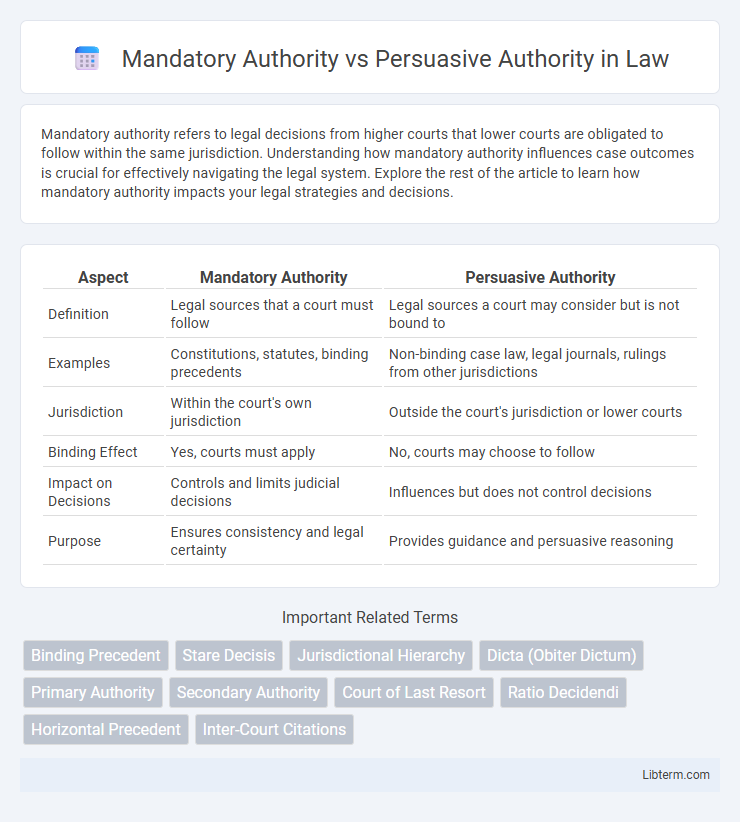Mandatory authority refers to legal decisions from higher courts that lower courts are obligated to follow within the same jurisdiction. Understanding how mandatory authority influences case outcomes is crucial for effectively navigating the legal system. Explore the rest of the article to learn how mandatory authority impacts your legal strategies and decisions.
Table of Comparison
| Aspect | Mandatory Authority | Persuasive Authority |
|---|---|---|
| Definition | Legal sources that a court must follow | Legal sources a court may consider but is not bound to |
| Examples | Constitutions, statutes, binding precedents | Non-binding case law, legal journals, rulings from other jurisdictions |
| Jurisdiction | Within the court's own jurisdiction | Outside the court's jurisdiction or lower courts |
| Binding Effect | Yes, courts must apply | No, courts may choose to follow |
| Impact on Decisions | Controls and limits judicial decisions | Influences but does not control decisions |
| Purpose | Ensures consistency and legal certainty | Provides guidance and persuasive reasoning |
Definition of Mandatory Authority
Mandatory authority refers to legal sources that courts are required to follow when deciding cases, including statutes, constitutions, and binding precedent from higher courts within the same jurisdiction. This authority has binding power, meaning that lower courts must apply the rules or decisions set forth by these sources without deviation. Understanding mandatory authority is essential for legal practitioners to ensure compliance with established laws and precedents that govern judicial decisions.
Definition of Persuasive Authority
Persuasive authority refers to legal sources or precedents that a court may consider and guide its decision-making but is not obligated to follow. These authorities include decisions from courts in other jurisdictions, legal scholarship, and secondary sources. Unlike mandatory authority, persuasive authority helps shape arguments by influencing judicial reasoning without binding precedent status.
Key Differences Between Mandatory and Persuasive Authority
Mandatory authority requires courts to follow precedent established by higher courts within the same jurisdiction, ensuring binding legal decisions. Persuasive authority, however, consists of legal sources such as decisions from courts in other jurisdictions or lower courts, which may influence but do not compel a ruling. The key difference lies in the binding nature of mandatory authority compared to the advisory role of persuasive authority in judicial decision-making.
Sources of Mandatory Authority
Mandatory authority consists of legal sources that courts must follow, including constitutions, statutes, regulations, and binding case law from higher courts within the same jurisdiction. These sources provide binding rules and precedents that govern judicial decisions and ensure consistency and predictability in the application of the law. Statutes enacted by legislatures and precedents set by higher appellate courts are primary examples of mandatory authority that lower courts cannot disregard.
Sources of Persuasive Authority
Sources of persuasive authority include judicial decisions from lower courts, legal commentaries, law review articles, and expert opinions that judges may consider but are not bound to follow. Secondary sources such as legal treatises, academic writings, and international case law provide interpretative guidance that can influence judicial reasoning. These persuasive authorities help courts fill gaps in precedent and support arguments in the absence of binding mandatory authority.
Role of Jurisdiction in Determining Authority
Mandatory authority consists of legal sources that a court must follow within its jurisdiction, such as statutes, binding precedents, and constitutional provisions. Persuasive authority includes decisions or materials from other jurisdictions or lower courts that a court may consider for guidance but is not obligated to follow. The role of jurisdiction is critical, as only decisions from a court within the same jurisdiction serve as mandatory authority, while those from outside jurisdictions typically function as persuasive authority.
Practical Examples of Mandatory and Persuasive Authority
In legal research, mandatory authority includes statutes, constitutions, and binding precedents directly controlling a court's decision, such as a state supreme court ruling within that jurisdiction. Persuasive authority consists of non-binding sources like decisions from other jurisdictions, legal treatises, or law review articles that courts may consider for guidance, exemplified by a federal court referencing a state appellate court opinion. Understanding these distinctions helps attorneys craft stronger arguments by relying on binding mandates while supplementing with persuasive insights when mandatory rules are absent.
Importance of Authority in Legal Reasoning
Mandatory authority consists of legally binding precedents and statutes that courts must follow, ensuring consistency and predictability in judicial decisions. Persuasive authority includes non-binding sources such as dicta, dissenting opinions, or decisions from other jurisdictions, which may influence but not control the court's ruling. The importance of authority in legal reasoning lies in its role in guiding judges to apply established principles, justify rulings, and uphold the rule of law within a structured legal framework.
How Courts Use Mandatory and Persuasive Authority
Courts rely on mandatory authority, such as binding statutes and precedential decisions from higher courts within the same jurisdiction, to ensure consistent application of the law. Persuasive authority, including rulings from courts in other jurisdictions or legal scholarship, influences judges when mandatory authority is absent or ambiguous, guiding interpretation and reasoning. The weight given to persuasive authority varies depending on the court's hierarchy and the relevance of the analogous legal principles involved.
Impact on Legal Research and Citation
Mandatory authority requires courts to follow binding precedents within the same jurisdiction, ensuring legal research prioritizes these sources for authoritative citation and decision-making. Persuasive authority influences courts through reasoning or precedents from other jurisdictions, expanding the scope of legal research by introducing relevant but non-binding arguments. Effective citation balances mandatory authority for binding rules and persuasive authority for supporting or enhancing legal arguments within case law analysis.
Mandatory Authority Infographic

 libterm.com
libterm.com